A home is probably one of the largest purchases you'll ever make. To protect this investment, you need to buy insurance. Mortgage lenders usually require homeowners to have adequate homeowners insurance. Even if you rent a place to live, you will want to buy a policy designed for renters that covers both your liability and personal belongings.
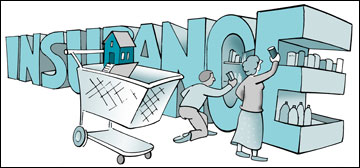 Homeowners and renters insurance are combinations of property insurance and liability insurance. The property portion of homeowner policies provides protection for loss or damage to your house and other structures on the property, as well as your personal property. Renters insurance covers loss or damage to your personal property. The liability portion of each policy protects you from having to pay for another person's injury or damaged property when you are held responsible.
Homeowners and renters insurance are combinations of property insurance and liability insurance. The property portion of homeowner policies provides protection for loss or damage to your house and other structures on the property, as well as your personal property. Renters insurance covers loss or damage to your personal property. The liability portion of each policy protects you from having to pay for another person's injury or damaged property when you are held responsible.
What is insurance?
To understand homeowners insurance, you need a basic understanding of insurance in general. Insurance is a partnership between you, others like you and an insurance company. All partners share a risk (the potential for injury or financial loss), and each individual pays in a sum of money (the premium) to a fund or “pool” held by an insurance company. That pool of money is then used to pay anyone in the group who suffers a covered financial loss.
Insurance is one of four ways commonly used to manage risk:
- Avoid risk as much as possible. For example, if you choose not to have a trampoline in your back yard, you avoid the risk of your children or their friends falling off the trampoline and getting injured.
- Reduce the chance of loss. You reduce risk when you install smoke alarms, dead-bolt locks or lock your door.
- Accept the fact that you will have to pay for some financial losses yourself. The cost of the insurance can be more expensive than the loss you could experience. You cannot insure for everything. Deductibles on insurance policies are one way that you accept the responsibility for at least some risk. The size of the deductible depends upon how much risk you're willing to accept and able to afford.
- Transfer risk to an insurance company. Determine which risks you can and should accept yourself and which risks are best handled in other ways. When you transfer your risk to an insurance company, costs are involved — the premium you pay for the insurance and the deductible you will pay if you face a loss. A good financial manager measures the risk of loss against the cost of insurance.
Standard homeowner policies
Some companies write their own homeowner policies, but most use standard forms developed by a company called ISO. This makes it easy to compare policies from company to company. They range from HO-1 to HO-8, but not all types are offered in every state. Policies are written in one of two ways:
- The policy covers only the perils that are specifically named in the policy, or
- The policy covers all perils except the ones specifically identified as not covered. Below are policies commonly sold in Missouri. Review Table 1. Homeowners insurance policies to learn what is and is not covered by the various policies.
HO-2 (Broad Form) covers 18 specified perils (the cause of a loss) that can lead to damage. Examples of coverage are damage or loss from fire, theft, windstorms or vandalism.
HO-3 (Special Form) provides protection on the structure for all perils except those specifically excluded, such as flood, earthquake, neglect, war, or nuclear accident.
HO-4 (Renters Contents Broad Form) is commonly referred to as renters insurance. This provides protection for the renter's household contents and other personal belongings. It also covers extra living expenses, liability coverage and medical payments.
HO-5 (Special Form) is offered by some companies. It covers everything included in HO-3 policies, as well as providing additional coverage. Review the policy to find out specifically what is included.
HO-6 (Condominiums) insures condominium owners for personal property losses and additions that the condominium association may not cover. It typically covers all perils included in an HO-2 policy. Before purchasing a condominium, clarify what the condominium association's insurance covers, and what would be your responsibility.
HO-8 (Actual Cash Value) is designed for older homes where the replacement cost would be much higher than the market or actual cash value of the home. This type of insurance is sometimes called market value, modified or older home coverage. These policies specify that the home would be returned to a livable condition with commonly used materials. For example, a well-preserved historical home might include beautiful woodwork, imported marble or other unique features that would be extremely expensive to replicate. With this type of coverage, the home would be repaired or replaced using more common, less expensive materials.
Table 1. Homeowners insurance policies (? denotes coverage provided by that policy)
| Policies | HO-2 broad form | HO-3 special form | HO-4 renters contents broad form | HO-5 special form | HO-6 condominiums | HO-8 actual cash value |
|---|---|---|---|---|---|---|
| Perils | All perils except those specifically excluded | Covers contents | All perils except those specifically excluded, with additional coverage beyond HO-3 | |||
| Fire or lightning | X | X | X | X | ||
| Windstorm or hail | X | X | X | X | ||
| Explosion | X | X | X | X | ||
| Riot or civil commotion | X | X | X | X | ||
| Damage by aircraft | X | X | X | X | ||
| Damage by vehicles | X | X | X | X | ||
| Smoke | X | X | X | X | ||
| Vandalism or malicious mischief | X | X | X | X | ||
| Theft | X | X | X | X | ||
| Glass breakage | X | X | X | X | ||
| Volcanic eruption | X | X | X | X | ||
| Falling objects | X | X | X | |||
| Weight of ice, snow or sleet | X | X | X | |||
| Accidental discharge or overflow of water or steam from plumbing, heating or air-conditioning systems | X | X | X | |||
| Bursting, cracking, burning or bulging of a steam or hot water heating system, or hot water heater | X | X | X | |||
| Freezing of plumbing, heating, and air-conditioning systems and home appliances | X | X | X | |||
| Sudden and accidental damage from accidentally generated electrical current | X | X | X | |||
| Collapse of building | X | X | X |
Note
Flood and earthquake damage is not covered by any of these policies. See homeowners insurance for special needs for more information.
Policy sections
Most policies contain two main sections: Section 1 (Property Coverage) and Section 2 (Liability Coverage). Here's a closer look at what's included in each section.
Section 1 – Property Coverage
The dwelling
This includes the house itself and any attached structures, such as a porch, garage, or carport. Some policies will even pay for damage to trees and shrubs under certain circumstances.
Other structures on the property
In insurance language, these may be called appurtenant structures. These include detached buildings, such as a separate garage or storage shed. Check the policy to make sure there is enough coverage for the building(s). Typically, a percentage of the coverage on the house is assigned to detached structures. This may not be adequate.
Personal property
This includes items such as your furniture, appliances, clothing and other personal belongings. This property is usually covered whether it is in your home or if you have it with you when away from home. Most companies cover personal property up to 50 percent of the value of your house. Some policies go up to 65 percent to 75 percent. For renters insurance, you buy the amount of insurance needed based on the value of your personal possessions. Most policies have limits on the amount of coverage for specific items such as jewelry, hunting equipment, electronic equipment, collections, etc. You may be able to purchase extra coverage for these items at an additional cost. This coverage would be attached as an endorsement or rider to your policy, and is known as a floater.
Additional expenses
This type of coverage applies if your house is damaged by a covered peril that prevents you from living there until repairs can be completed. If you have to live somewhere else, the insurance company will pay for necessary living expenses (hotel/motel and meals) beyond your normal budget. There is a limit on the amount of additional expense coverage provided.
In addition to living expenses, coverage is often provided for items such as debris removal, fire department service charges, trees and shrubs or loss of food in a refrigerator or freezer due to a power outage. Be sure to read the policy to find out exactly what is covered.
Section 2 – Liability Coverage
Personal liability
This coverage provides protection if other people are injured on your property or for damage you cause to their property. The coverage usually includes damage done by you, members of your family and even family pets. It's important to note, though, that some pets, such as certain breeds of dogs, are considered high risk and could be excluded from coverage under standard homeowners insurance policies.
Standard policies may not always provide enough liability coverage. You can usually increase the coverage through your homeowners insurance, or you may want to consider purchasing what's called an umbrella policy. An umbrella policy covers liability losses that are larger than those covered by standard homeowners, auto or professional liability insurance policies. To purchase an umbrella policy, you must carry the basic coverages and have your homeowners and auto insurance with the same company.
Some items are not typically covered by the liability portion of a homeowners insurance policy. These include use of the home for business purposes, employees, and property you rent to someone else. There are other forms of liability insurance policies, such as professional liability insurance, that cover those types of losses.
Medical payments
This pays for medical services needed when people suffer minor injuries while on your property without having to prove who was at fault. This does not include trespassers or family members. Medical services for injuries to others that occur away from your property may also be covered (if you are held liable for those injuries).
Homeowners insurance for special needs
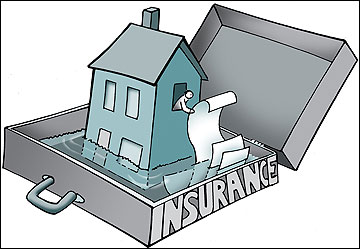 Flood insurance
Flood insurance
Location is an important consideration when buying a home. Many homeowners do not know that standard policies do not include damage from rising water. If the property is located in a flood plain (an area with a history of flooding), you may be required by the mortgage lender to purchase flood insurance (such as anyone with a federally backed home mortgage in a high-risk area). Whether or not it's required, flood insurance is a good idea if the area is prone to flooding.
Flood insurance coverage is provided through the National Flood Insurance Program (NFIP). They have arranged with private insurance companies to sell and service flood insurance policies. Your agent or company can help you find this coverage. You can also visit the NFIP website or call 888-379-9531 for more information.
Earthquake insurance
Earthquake damage is typically excluded from homeowners policies. If you live in an area that could be affected by earthquakes, you may want to consider a special endorsement (an amendment or addition to your basic policy) to cover earthquake damage.
FAIR plans
Fair Access to Insurance Requirements (FAIR) Plans were created for people who own property considered “high risk.” Limited insurance coverage, as well as limited crime coverage, is provided for property that may not be able to qualify for traditional insurance. These plans are operated by the insurance industry. In Missouri, the Missouri Property Insurance Placement Facility handles the plans. Premiums are usually higher, so consider this option only if you cannot get traditional coverage. For more information, contact the Missouri Property Insurance Placement Facility, 906 Olive Street, Suite 1000, St. Louis, Mo. 63101, 314-421-0170 or 800-392-7240, missourifairplan.com/.
Shopping for insurance
You're ready to go shopping. But where do you begin? Should you go to the agent you or your parents have always used? Should you check out other companies? What about offers you receive in the mail or see on television, in newspapers, or over the Internet? How do you figure out which is the best coverage, with the best service, at the best price?
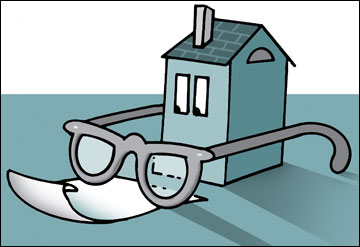 Start by considering the financial strength of the companies and their reputations for timely, fair and reasonable settlements. Here are some good sources of information:
Start by considering the financial strength of the companies and their reputations for timely, fair and reasonable settlements. Here are some good sources of information:
- Review reports from rating companies such as A.M. Best, Standard and Poor's or Moody's. They provide information on the financial soundness of insurance companies.
- Consumer Reports magazine has published information on the way various companies settle claims.
- The Missouri Department of Insurance, Financial Institutions and Professional Registration, (P.O. Box 690, Jefferson City, Mo. 65102, insurance.mo.gov) has information about insurance companies. They can tell you if a company is operating legally in the state. They also can give you information on the number of complaints filed against companies, and a ratio that can be used to compare companies. They have other helpful consumer information as well.
- The Better Business Bureau can provide information about complaints of poor service.
- Talk to your friends, neighbors, relatives and business associates to find out how their insurance companies treat them, especially when they've suffered a loss.
Compile basic information about the property. Include the address, materials the house is made of (such as wood or brick), square footage, number of rooms in the house, type of heating, distance from the nearest fire station or fire hydrant, etc. This will make it easier to compare policies and prices from different companies because they will be basing their quotes on exactly the same information. You can use the Homeowners Insurance Comparison Guide to help you gather this information on your computer screen.
Homeowners Insurance Comparison Guide (PDF)
As you compare companies, consider the ease of getting assistance if you have questions or need to file a claim. Are you comfortable dealing with businesses over the phone or through email, or do you prefer to walk into a local office and speak to an agent in person? If you choose to work through a local agent, consider how he or she works. Some agents work for several different companies (independent agents), while others work for one company (direct agents). Whichever you choose, you should expect the agent to keep your interests in mind. Expect a good agent to:
- Explain the options, advantages and disadvantages of each type of policy in language you understand.
- Give sound advice about the coverage you need and about the increases you should make as replacement costs rise.
- Answer all your questions and help you understand the policy before you sign the contract. This is especially important because insurance policies are usually not easy to read.
If you decide to explore options available through the Internet, professional organizations, etc., do your homework. Find out as much as you can about the companies, their reliability, financial strength and reputation for taking care of their clients.
Once you narrow the field to one or two companies, take the time to read the policies being offered to make sure you understand what is and is not included before you make a final decision. Don't be afraid to ask questions if you don't understand the terms used.
You may also wish to obtain CLUE (Comprehensive Loss Underwriting Exchange) reports. There are two major property databases, CLUE and A-PLUS (Automated Property Loss Underwriting System). Reports from either database are often referred to as CLUE reports. These databases have information about claim histories on property. Insurance companies use this information to set insurance premiums. Therefore, it's a good idea to check your report before filling out an insurance application. Consider reviewing a copy of the report for a house you are thinking about purchasing. You cannot directly access a report on property you don't own, but you can ask the seller to provide a copy prior to purchase. To learn more about or get copies of CLUE reports, contact LexisNexis, 866-897-8126.
Once you buy a policy, don't put it away and never think about it again. Periodically review it to be sure the coverage is up to date. For example, if you make major changes to the property that might require increasing or reducing coverage, contact your agent or company. Complete a household inventory, keep it up to date and place a copy of it in a safe place away from the home. Be sure you can locate your agent's or company's contact information if you need it.
Lower your cost
Here are some ways you can cut your homeowners insurance costs:
- Raise your deductible
This is the part of the loss you pay before the insurance company starts paying. The higher the deductible, the lower the premium. - Multi-coverage discounts
Many companies offer discounts for having more than one type of coverage with them (such as homeowners and auto). 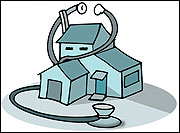 Minimize risks
Minimize risks
Complete home improvements. Update wiring, plumbing, and heating/air conditioning units. Install safety devices such as smoke detectors, fire or burglar alarms, dead bolt locks and fire extinguishers.- Improve your credit score
It's becoming standard in the insurance industry to use your credit score as a factor in determining your premium. The higher the score, the lower the premium. In the case of a couple, they typically use the higher score. It's important to remember that the scoring systems used by the insurance industry are different that those used by creditors, so your scores could be different. - Pay premiums less frequently
By paying once a year instead of two or three times a year, you save the company bookkeeping costs which can result in lower premiums. Remember that you must plan for this periodic expense by putting aside money on a regular basis (such as every paycheck) so you'll have the money when the premium payment comes due.
Filing a claim
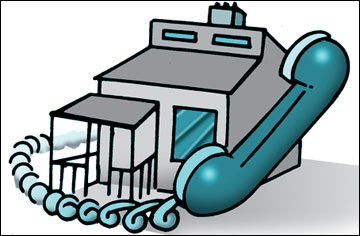
- If you suffer a loss, notify the company immediately that you plan to file a claim. If property has been damaged or destroyed, the company will probably ask for repair or replacement estimates from one or two reliable contractors. A contractor may charge a fee for an estimate, but you may be able to get at least part of your money back if you use that contractor to complete the needed repairs or replacement.
- Before the claims adjuster arrives, make a list of stolen, damaged or destroyed items. Use your up-to-date household inventory to supply the necessary details about the cost, age and condition. If the property was damaged or destroyed, take pictures to help you document your loss. The adjuster will help you file your claim, determine the amount of coverage and the cost to repair or replace, describe the work to be done, and determine the amount of the total claim.
- If you have a major loss, lock the premises and board up broken doors, windows and holes to prevent vandalism, theft or further damage. In winter, turn off the water and drain the pipes. The company is not liable for further damages if you do not protect your property.
- If you have a mortgage, let your lender know what happened. Keep making your mortgage payments even in the event of a complete loss. If you do not, you will be delinquent on your mortgage. Late fees and legal fees will begin to add up.
- If you are involved in a liability case, or a potential liability case, notify your insurance company. The sooner they know about your situation, the better they can tell you what to do. In the meantime, do not make any statements accepting responsibility for any loss that has occurred.
- Keep copies of everything you submit with your claim, and be sure to keep detailed records of all expenses. Do not sign any settlement agreements with the insurance company until you are satisfied with what they are offering to do for you, as stated in your policy. If you have a large claim, consider having an attorney review the agreement.
Common terms of homeowners insurance
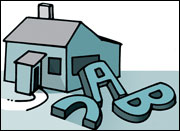 Actual cash value
Actual cash value
The value of the insured property (replacement cost minus depreciation).- Claim
A formal request made to an insurance company to get reimbursed for a covered loss. - Conditions
The basic rules of the insurance agreement, including the obligations of both you as policy holder and the insurance company. Conditions may include the procedures for making a claim, rules for cancelling the policy, and procedures for changing the terms of the policy. - Declarations
Basic information about the policy holder, property and coverage, including information about the insured person and the property, the premium you will be expected to pay, the time period of coverage and the policy limits. - Deductible
Out-of-pocket expenses the insured agrees to pay before the insurance company will start paying. The higher the deductible the lower the premium. - Endorsement or rider
An addition or amendment to a basic insurance policy. - Exclusions
Items not covered by the insurance policy. - Face value or face amount
The dollar value of protection provided by the policy. This is used to calculate the premium. - Floater
Protection for losses to movable personal property regardless of where the loss occurs. While some coverage is included in standard policies, a floater provides extra coverage for items that cost more than what is covered by most policies. - Hazard
Anything that increases the chance a peril will occur. - Liability
A financial loss to someone else for which you may be held responsible. - Peril
A cause for a loss. - Premium
Money paid for insurance coverage. - Replacement value
What it would cost to repair, rebuild or replace the property at today's prices.
Resources
- Bozworth, C., LaFon, J., Beaugard, C., Cavanagh, J., and Murphy, L. 2004. Money Action Plan curriculum, MU Extension.
- Consumer's Guide to Homeowners & Renters Insurance, Department of Insurance, Financial Institutions and Professional Registration, State of Missouri.
- Garman, E. T., and Forgue, R. 2006. Personal Finance. Eighth edition. Houghton Mifflin Company.
- Insurance Information Institute website: iii.org.
- Missouri Fair Plan website: missourifairplan.com/.
- Missouri Department of Insurance, Financial Institutions and Professional Registration, State of Missouri website: insurance.mo.gov.
Acknowlegements
This guide was revised by Janet C. LaFon, Family Financial Education specialist, MU Extension.
It was originally written by Robert O. Weagley, associate professor Personal Financial Planning, and Ruth Griffith, former graduate student, Personal Financial Planning, MU.
Thanks to Calvin Call and Brent K. Butler, of the Missouri Insurance Coalition, for reviewing this guide.
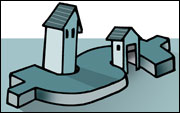 Review your policy on a regular basis (at least once a year) to make sure you don't fall below the required level of coverage. Include any improvements or recent purchases that add value to the house. Also consider increased costs of replacement. Some companies provide a low-cost “inflation guard” that periodically increases the amount of coverage on your home. Even if you have this inflation protection, be sure your coverage keeps up with the appreciated value of your home.
Review your policy on a regular basis (at least once a year) to make sure you don't fall below the required level of coverage. Include any improvements or recent purchases that add value to the house. Also consider increased costs of replacement. Some companies provide a low-cost “inflation guard” that periodically increases the amount of coverage on your home. Even if you have this inflation protection, be sure your coverage keeps up with the appreciated value of your home.